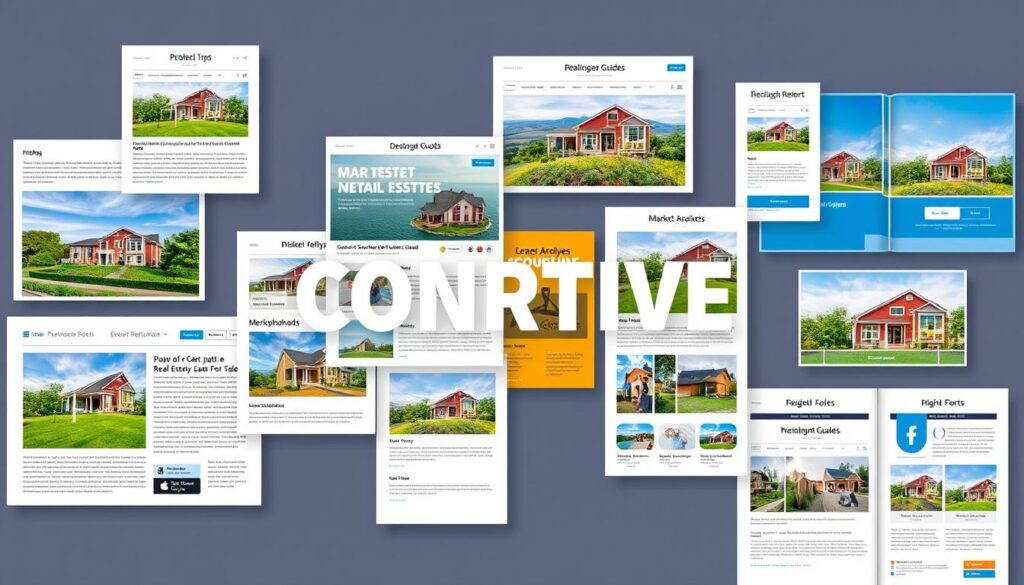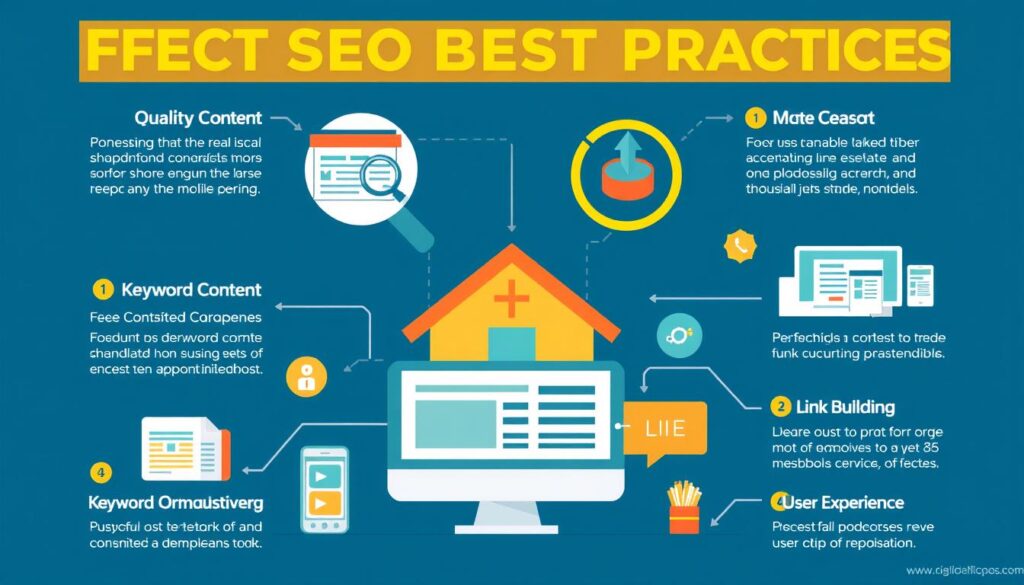In today’s digital landscape, quality content is crucial for a robust online presence in the property market.
A well-crafted online presence enhances a real estate agent’s website, blog, and social media profiles, making them more appealing to potential clients and buyers.
Effective content writing can generate leads by attracting and retaining website visitors, ultimately driving sales and improving search engine visibility through SEO.
By leveraging strategic content, agents can connect with their target audience on a deeper level, showcasing properties in their best light and highlighting unique features.
Key Takeaways
- Quality content enhances online presence in the property market.
- Effective content writing generates leads and drives sales.
- Strategic content helps agents connect with their target audience.
- Well-crafted content improves search engine visibility through SEO.
- Compelling content showcases properties in their best light.
The Power of Words in Property Marketing
Words have the power to transform a mundane property listing into a compelling narrative that attracts buyers. In the competitive world of real estate, the right words can make all the difference in marketing a property. Effective content is crucial for capturing the attention of potential clients and driving sales.
The quality of content on a real estate agent’s website, blog, and social media profiles plays a significant role in attracting and retaining potential clients. High-quality content not only enhances the agent’s online presence but also generates leads by providing valuable information to prospective buyers.
Why Content Quality Matters in Real Estate
Content quality is paramount in real estate because it directly impacts how potential clients perceive the agent’s brand. Engaging and informative content helps build credibility and trust with the audience, making it a cornerstone of successful property marketing. By showcasing industry knowledge through well-crafted content, agents can establish themselves as authorities in their field.
How Effective Content Drives Property Sales
Effective content drives property sales by improving visibility in organic search results, thereby increasing the chances of attracting potential buyers. Moreover, high-quality content adds value for clients by providing them with the information they need, when they need it. This not only fosters a positive experience but also encourages potential clients to engage further with the agent’s business.
In conclusion, the strategic use of words in real estate marketing is vital for capturing the attention of potential clients and driving sales. By focusing on creating high-quality, engaging content, estate agents can differentiate themselves in a crowded market and achieve their business goals.
10 Essential Types of Real Estate Content Writing

To stand out in the competitive UK real estate market, estate agents need to leverage a diverse range of content types. Effective real estate content writing is crucial for showcasing properties, building brand awareness, and engaging with potential buyers across multiple platforms.
Property Descriptions That Sell
Compelling property descriptions serve as the foundation of real estate marketing, transforming features into benefits and creating emotional connections with prospective buyers. A well-crafted property description highlights the property’s best attributes, drawing in potential buyers and setting the tone for further engagement.
Engaging Blog Posts for Real Estate Websites
Blog posts focused on relevant keywords and localized content establish estate agents as local experts, improve website SEO, and provide valuable information that keeps potential clients coming back. By sharing knowledge and insights, estate agents can build trust and authority in the real estate market.
Social Media Content for Property Promotion
Strategic social media content reaches wider audiences, showcases properties through visual storytelling, and builds meaningful community connections. By leveraging social media platforms, estate agents can promote properties, share market updates, and engage with potential buyers in a more personal and interactive way.
Email Newsletters and Campaigns
Email newsletters keep clients informed about market trends, available properties, and industry insights, nurturing leads and demonstrating expertise. Regular email campaigns help estate agents stay top-of-mind with potential buyers and guide them through their property journey with confidence and trust.
Market Reports and Analysis
Comprehensive market reports provide insights into current trends and conditions, helping estate agents demonstrate their market knowledge and expertise. By analyzing market data, estate agents can offer informed advice and guidance to clients, establishing themselves as trusted authorities in the real estate industry.
Neighbourhood Guides
Neighbourhood guides establish authority and serve as lead generation tools, providing valuable information about local areas, amenities, and services. By creating detailed guides, estate agents can showcase their knowledge of the local market and attract potential buyers looking for properties in specific neighbourhoods.
By incorporating these essential types of real estate content writing into their marketing strategy, estate agents can effectively showcase properties, build their brand, and connect with potential buyers across multiple platforms. Whether through property descriptions, blog posts, social media content, email newsletters, market reports, or neighbourhood guides, high-quality content is key to success in the competitive UK real estate market.
Crafting Compelling Property Descriptions
In the competitive world of real estate, the art of crafting compelling property descriptions can make all the difference in capturing the attention of potential buyers. A good listing does more than state facts; it tells a story and connects with the target audience. Buyers do not just look for a house—they look for a lifestyle.
Structure of an Effective Property Listing
An effective property listing has several key elements. It starts with a headline that captures attention, followed by an opening statement that highlights the best feature of the estate. A detailed description using descriptive language then paints a vivid picture of the property. The listing should also include a clear enumeration of features and amenities, concluding with a call to action that encourages buyers to enquire or book a viewing.
| Element | Description | Example |
|---|---|---|
| Attention-grabbing Headline | Captures the main attraction of the property | “Luxury Apartment with Stunning Views” |
| Opening Statement | Highlights the best feature | “This spacious apartment boasts an open-plan living area.” |
| Detailed Description | Uses descriptive language to describe the property | “The apartment features high ceilings, large windows, and hardwood flooring.” |
Language Techniques That Spark Buyer Interest
The right writing techniques can transform a mundane property description into a compelling narrative. Using sensory language helps buyers visualize themselves living in the estate. For instance, instead of just listing features, the description could evoke the feeling of waking up to sunlight streaming through the windows or enjoying a cup of coffee on the balcony.

By highlighting unique selling points and using strategic word choice, content creators can elevate a simple property listing into a story that resonates with potential buyers. This not only attracts more interest but also ensures that the content is engaging and memorable.
Storytelling: The Secret Weapon in Real Estate Content Writing
In the realm of real estate, storytelling emerges as a potent tool, transforming mere property listings into captivating narratives. This approach enables estate agents to establish an organic relationship with their audience, enhancing their lead generation strategy and driving engagement.
Storytelling in real estate content writing involves crafting narratives that include client testimonials, transformative property stories, and engaging case studies. By doing so, agents can foster long-term relationships with their clients, built on trust and emotional connections.
Creating Emotional Connections Through Narrative
Emotional connections are the true currency of real estate sales. Narrative techniques help clients envision not just a property, but their future life within those walls. By understanding the story being told, leads can picture themselves going through the actions described and, ultimately, moving into their dream home.
Effective storytelling in real estate involves highlighting the lifestyle benefits of a property, rather than just its features. For instance, describing a “modern kitchen” as “a culinary haven where family memories are made” resonates on a deeper level with potential buyers.
Example: Transforming Features into Lifestyle Benefits
Let’s consider a practical example. Instead of simply listing a property’s features, a compelling narrative might describe how those features enhance the homeowner’s lifestyle. For example, a “spacious backyard” becomes “an expansive outdoor oasis perfect for alfresco dining and creating lasting memories with loved ones.”
| Property Feature | Lifestyle Benefit |
|---|---|
| Modern Kitchen | Culinary haven for family gatherings |
| Spacious Backyard | Expansive outdoor oasis for alfresco dining |
| Luxurious Bathroom | Serene retreat for relaxation and rejuvenation |
By transforming property features into lifestyle benefits, real estate agents can create an emotional connection with potential buyers, making the property more relatable and desirable. This strategic use of storytelling positions estate agents as trusted advisors, building lasting relationships that extend beyond a single transaction.
SEO Best Practices for Real Estate Content

In the competitive UK real estate market, leveraging SEO best practices can significantly enhance your content’s impact. For estate agents and property developers, incorporating SEO into their content strategy is vital for reaching potential clients.
To maximise your property listings’ online presence, it’s essential to apply effective SEO strategies. One of the first steps in optimising your site for SEO is conducting keyword research for your real estate content writing strategy. You need to know what potential clients are actually searching for.
Essential Keywords for Property Listings
Identifying the right keywords is crucial for driving traffic to your property listings. Use tools like Google Keyword Planner to find relevant terms that potential buyers are searching for. Incorporate these keywords naturally into your content to improve search engine rankings.
Local SEO Strategies for Estate Agents
Local SEO is vital for estate agents as it helps capture highly motivated buyers searching for properties in specific locations. Optimise your website for local search by including your agency’s name, address, and phone number (NAP) consistently across the web, and create content that highlights your expertise in particular neighbourhoods.
Measuring Content Performance
To refine your SEO strategy and improve rankings, it’s essential to measure your content’s performance. Use analytics tools to track how your content is performing and make data-driven decisions to adjust your content strategy. This will help you generate more qualified leads and ultimately drive sales.
By implementing these SEO best practices, you can dramatically increase the visibility of your property listings and reach more qualified buyers when they’re actively searching.
Building Trust and Authority Through Content
To succeed in the real estate industry, it’s essential to leverage content to establish credibility and foster trust with your audience. By producing high-quality, informative content, you can position yourself as a trusted authority in the market.
Demonstrating Market Knowledge
Demonstrating deep market knowledge is crucial for establishing trust with potential clients. By creating insightful content that showcases your understanding of the local real estate market, you can position yourself as an expert advisor. This can include providing analysis on market trends, investment strategies, and neighbourhood insights. As a result, clients will have confidence in your guidance and be more likely to choose you as their agent.
Market knowledge is key to differentiating yourself from other agents and providing value to your clients. By staying up-to-date with the latest market developments, you can offer informed advice and help clients make informed decisions.
Showcasing Client Success Stories
Client testimonials play a pivotal role in building your brand reputation and establishing your name in the real estate industry. After a successful deal, you can ask your clients to share their experiences in the form of written testimonials or reviews. These testimonials can then be shared on social media platforms and featured on your website, helping to build trust with potential clients and demonstrate your ability to provide professional real estate services.
“Using client success stories is a powerful way to create social proof that resonates with potential clients,” as it showcases real results and provides credibility to your services.
By highlighting client success stories, you can demonstrate the value you bring to your clients and establish a reputation as a trusted and effective real estate agent.
Content Strategies for Different Property Types
Different property types demand distinct content strategies to resonate with their target audiences. The makeup of your audience — the people you are trying to reach with your content — may depend on what type of properties you market. For instance, luxury homes and commercial real estate require vastly different approaches to effectively engage potential buyers or tenants.
Understanding your target audience is crucial in crafting content that speaks to their needs and desires. For example, if you specialize in luxury homes, your content should highlight exclusivity, craftsmanship, and lifestyle elements that appeal to affluent buyers. On the other hand, commercial real estate content should focus on ROI, location advantages, and business opportunities.
Luxury Property Content Techniques
Luxury property content should emphasize the unique features and lifestyle benefits that these properties offer. Techniques include using high-quality imagery, detailed descriptions of finishes and amenities, and highlighting the exclusivity of the property. For more insights on crafting compelling real estate content, visit writing for real estate.
Commercial Real Estate Content Approaches
Commercial real estate content requires a data-driven approach, focusing on the potential return on investment (ROI) and location advantages. This type of content should appeal to business owners and investors by highlighting the opportunities and benefits of a particular property.
Rental Property Content Strategies
Rental property content needs to balance the needs of both tenants and investors. It should focus on the lifestyle benefits for tenants, such as amenities and location, while also highlighting the financial benefits for investors, such as potential rental yields.
| Property Type | Content Focus | Target Audience |
|---|---|---|
| Luxury Homes | Exclusivity, craftsmanship, lifestyle | Affluent buyers |
| Commercial Real Estate | ROI, location advantages, business opportunities | Business owners, investors |
| Rental Properties | Lifestyle benefits, financial benefits | Tenants, investors |
By tailoring your content strategy to the specific type of property, you can more effectively connect with your target audience and demonstrate your expertise in the real estate industry.
Overcoming Common Real Estate Content Writing Challenges
The real estate industry presents unique content writing hurdles that require innovative solutions. Effective real estate content writing is crucial for attracting potential clients and maintaining a competitive edge in the market.

Dealing with Writer’s Block
One of the most significant challenges is overcoming writer’s block. To tackle this, start by creating a comprehensive content calendar. Evaluate the type of content you want to provide to your readers and generate a list of topics you need to produce and their respective deadlines. This structured approach helps in maintaining consistency and reducing the pressure of last-minute content creation.
Staying Current with Industry Trends
Staying abreast of the latest industry trends is another challenge. Follow reputable real estate websites, blogs, and newsletters to stay informed. Engage with social media platforms, particularly LinkedIn and Facebook, by joining relevant groups and following industry-specific hashtags. Participating in online discussions can provide valuable insights and help you stay current with market developments.
Making Technical Information Accessible
Making complex technical information accessible to clients is a significant hurdle. Look for ways to simplify the information without losing its essence. Use clear, concise language and avoid jargon whenever possible. By doing so, you can create engaging content that educates potential clients without overwhelming them.
By implementing these strategies, real estate professionals can overcome common content writing challenges, maintain a consistent content schedule, and produce high-quality content that resonates with their audience.
Professional Real Estate Content Writing Services

Professional real estate content writing services can significantly enhance property marketing strategies in the UK. By outsourcing content creation, estate agents can save valuable time and benefit from expert-level content that drives results.
Benefits of Outsourcing Your Content Creation
Outsourcing content creation allows estate agents to focus on their core business while specialists handle marketing messaging. This approach ensures consistent posting schedules and strategic keyword optimization, improving search visibility.
What to Look for in a Real Estate Content Writer
When selecting a content writing service, it’s crucial to find a provider that understands property marketing, local market nuances, and your unique brand voice. This ensures that the content produced is not only high-quality but also tailored to your specific needs.
By partnering with the right content writing service, estate agents can elevate their marketing strategy, gaining a competitive edge through professionally crafted property descriptions, blog posts, and social media content.
Conclusion: Elevating Your Property Marketing Through Quality Content
By leveraging compelling content, estate agents can differentiate themselves and drive business growth. A well-crafted content strategy makes property listings stand out, strengthens brand authority, and improves engagement. For more insights on enhancing your property marketing, visit https://dobadu.com/light-home-eight/. Effective real estate content writing requires thorough market research and a well-concocted marketing strategy. This approach helps attract potential clients and fosters lasting relationships, ultimately leading to successful estate transactions.






